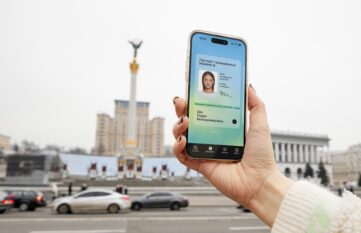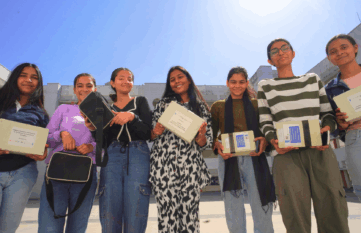The rapid development of artificial intelligence (AI) is heavily dependent on the constant growth of data ecosystems. However, this poses a problem: there is often a lack of inclusive and diverse data. Without complete and high-quality data, it will be difficult for political decision-makers to respond to the diverse needs of different social groups.
The German Federal Ministry for Economic Cooperation and Development (BMZ) addresses this issue in its feminist development policy, which pursues an intersectional and feminist approach.
Better data for fairer policies
Claudia Iveth Navarro Corona sits at a table in Mexico City thinking about brighter days ahead. “In order to have my dream job, the government must work on the eradication of inequality,” Claudia says on guaranteeing women’s rights as well as access to sexual and reproductive health.
The 36-year-old psychology professor and psychotherapist is one of thousands of women in Mexico City, whose voices were used in a citizen generated data initiative and processed by natural language understanding. The project was a result of a partnership between the Mexico City’s Women’s Ministry, the White Ribbon Alliance, ProsperIA, Equidad Organizacion Feminista and the BMZ-funded Data4Policy initiative.
Claudia’s story is not uncommon in Mexico, where access to care services such as childcare, schooling, food, and health can be unevenly distributed among the population. Mexico City’s government heard Claudia’s and other women’s voices as input to develop a more inclusive data ecosystem. This is possible thanks to the Secretary of Women in Mexico City who design policy with the use of a spatial intelligence platform, ProsperIA.
Inclusive Data Outside of the Gender Binary
Following successful programs and approaches on gender data gaps, the following phase of Data4Policy, “Learning from Experience – Data for Evidence-Informed Policymaking (Data2Policy)”, commissioned by the Data Lab from the BMZ, also seeks to further concepts of gender through the inclusion of sexual orientation and gender identity in alignment with BMZ’s LGBTI Inclusion Strategy. Including other projects into the conversation proliferates inclusive data across German development cooperation.
In the context of data and AI for sustainable development the project pursues a human rights-centered approach. This means, we continuously question our actions and activities, learning how to better support marginalized societal groups that are often overlooked or lack a voice in political processes.
Marie-Helen Cymorek, Advisor at the Global Program “Data2Policy”
Working together for more inclusion
Recently, the Data2Policy global programme organised a ‘Time to Learn’ session for GIZ colleagues. Prof Philip R. Crehan – co-founder of Koppa: The LGBTI+ Economic Power Lab – was invited as a guest speaker. He shared his knowledge and experience in the field of LGBTI+-inclusive data. The presentation of a new approach to the integration of LGBTI+-inclusive data into the Ecuadorian statistical system by the GIZ was particularly exciting.
Having data is a critical need to building LGBTI+ economic power. With Koppa, we recently launched a Consortium for Inclusive Data that brings together national statistical offices, development organizations, and civil society to address these gaps.
Prof. Philip R. Crehan, Founder of Koppa Lab
Data2Policy regularly publishes further use cases on the Data to Policy Navigator platform, which was developed together with the United Nations Development Programme (UNDP). The Navigator is currently being updated with detailed information on the project in Mexico City in which Claudia participated. It will also be expanded to include an approach to the inclusion of people with disabilities in Namibia and Koppa’s initiative in Belize, which protects LGBTI+ workers from discrimination. The Navigator will also present a project in Argentina that focusses on the use of feminist AI in the fight against gender-based violence. By publishing voices like Claudia’s, the aim is to inspire policy makers around the world to promote more inclusive data projects and develop fairer policies.
Read more about the work in Mexico City




